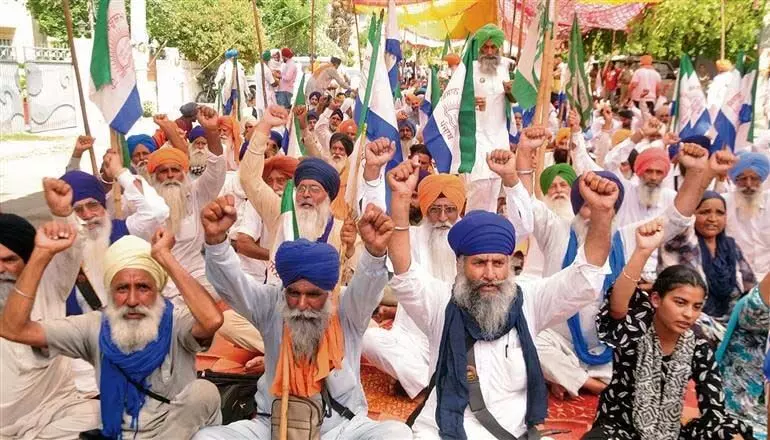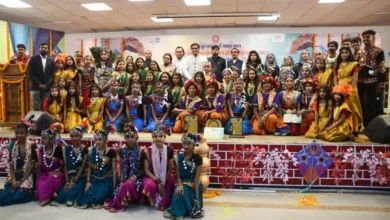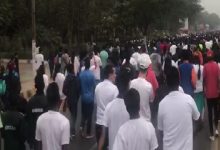BJP is polarizing Jat and Dalit votes to gain a foothold in Punjab

Farmer unions are concerned that the election campaign in Amritsar could lead to a rift between Mazhabi Sikhs and Jat Sikhs, who are the predominantly rural community. On Monday, BJP’s Amritsar candidate Taranjit Singh Sandhu called farmer leaders “shameless” for being prevented from meeting a Dalit family, and this has rung alarm bells among farmer unions. “The BJP is trying to polarise Dalits against Jats in state politics, and they are trying to spread the same hatred and poison in villages as well. They are trying to become the ‘messiah’ of Dalits,” says Swarn Singh Pandher of the Samyukta Kisan Morcha (non-political). Farmer leaders fear that with the narrative that farmer unions are only promoting the interests of Jats, the election campaign could further widen the rift between Mazhabi Sikhs and Jat Sikhs. The BJP’s campaign in Amritsar, which is contesting alone for the first time in Punjab after breaking away from the Shiromani Akali Dal (SAD), has given sleepless nights to Jat Sikh-dominated farmer unions, who have been staging protests against the saffron party’s candidates. The BJP had tried this caste division strategy in Haryana – where the party had mainly focused on non-Jat voters, relying on other backward classes (OBCs) – and the party is applying it in Punjab. This assumes significance as Dalits have nearly 35 per cent vote share in the state – the highest in any state in the country – while Jats have only 18 per cent of the electorate. Political observers say that not only in Amritsar, the party is trying to polarise votes on caste lines, thereby splitting the Sikh vote. This is especially true in the Mazhabi Sikh-dominated areas in Majha and Malwa regions, where the party is focusing on Mazhabi Sikhs in rural areas and Balmikis in urban areas, making them vulnerable to the “Jat dominance” of state politics. “It is not just a case of Jats versus Mazhabi Sikhs. The party is exploiting pre-existing differences between the Mazhabi/Balmiki and Ravidasia/Ramdasia communities over reservation in jobs. The Ravidasia/Ramdasia communities do not vote for the BJP. So, a polarisation between the Mazhabi Sikhs in rural areas and Balmikis in urban areas could benefit the BJP,” said an election strategist.
The divisions on the ground are becoming increasingly evident. Jaswinder Singh, a BJP worker from Jahangir village, said: “The SC community was attracted to the BJP because of the welfare schemes being offered by Prime Minister Modi.”
There are 39 sub-castes among Dalits in Punjab. The Mazhabi Sikhs/Valmikis account for 13 per cent of the Dalit vote share. Ramdasia Sikhs, Ravidassias and Ad-Dharmis account for 13.5 per cent of the vote share, while the rest of the vote share is held by other sub-castes.
The division between the Mazhabi Sikhs and the Jats will primarily impact the Shiromani Akali Dal – not only in the upcoming Lok Sabha elections, but also in future elections. The Mazhabi Sikhs have traditionally supported the Congress, while the SAD has a strong support base among the Jat farmers.
During the SAD rule of 2007-17, the freebies and welfare schemes introduced by the government appeased the Dalits. However, the next Congress government led by Amarinder Singh failed to appease the Mazhabi Sikhs even though the Congress gave the state its first Dalit CM – Charanjit Singh Channi from the Ravidassia community. However, the move did not pay off as the AAP defeated the Congress and the SAD in 2022.
The Mazhabi Sikhs are now pitted against the Ravidassia community, who have gone to court to challenge the 12.5 per cent reservation for Mazhabi Sikhs and Balmikis in government jobs. The Congress has regained the support of the Ravidassia community in the Doaba region, but overall, its hold on the Balmiki community in urban areas and Mazhabi Sikhs in rural areas has waned. At a recent meeting of Mazhabi Sikh and Balmiki community leaders, Baba Major Singh Sodhi of the Dashmesh Tarana Dal of Nihangs asked the Congress to make efforts to ensure that the Mazhabi/Balmiki reservation case is withdrawn from the Supreme Court – otherwise the community will boycott Congress candidates (Channi in Jalandhar and Dr Amar Singh in Fatehgarh Sahib) in the Lok Sabha elections. The Akali Dal is trying to consolidate Sikh votes by returning to core Panthic issues. The BJP is pursuing a completely opposite strategy, so we are going to face interesting and possibly volatile times.
















